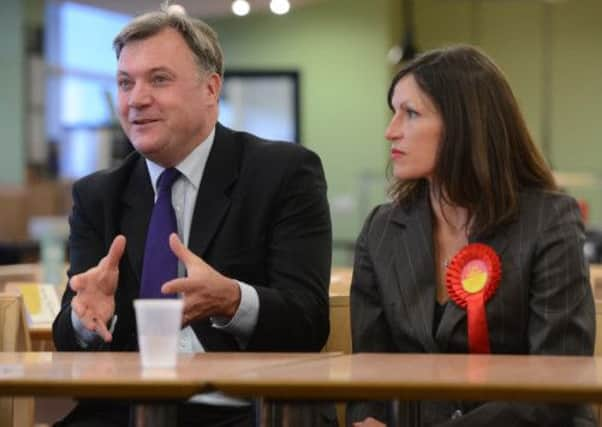Scottish independence: Balls ‘not bluffing’ on currency


On a visit to Scotland, the shadow chancellor described the SNP’s plans to be part of a sterlingzone as “utterly economically incoherent”.
Mr Balls travelled to Dunfermline to campaign for Labour in the forthcoming by-election on the same day that the First Minister visited the town to do likewise for the SNP.
Advertisement
Hide AdAdvertisement
Hide AdThe arrival of the two politicians at the same business park saw them air their views on the SNP’s currency plans and the Scottish Government’s recent announcement that it would not follow Labour by introducing an energy price freeze.
At the Lloyds Banking Group premises on the Pitreavie Business Park, Mr Balls was asked about Mr Salmond’s plans to keep the pound after independence.
“If Scotland votes for independence, there is absolutely no guarantee at all that Scotland will be able to keep the pound, whatever Alex Salmond says,” Mr Balls said.
“More than that, it would be a very, very difficult negotiation and I find it hard to see how the outcome could be an agreement that works either for an independent Scotland or for the rest of the UK.”
Asked if he meant what he said, Mr Balls replied: “I’m really not bluffing.”
Under the SNP’s scenario, the shadow chancellor said Scotland would be bound by very strict rules made in another country and wondered if the rest of the UK would be willing to indulge Mr Salmond’s plans.
“I think people would look at the huge difficulties of trying to hold together different sovereign nations within the euro and think that has been unstable. It’s been very hard to deal with divergence in the views of national parliaments. I find it really hard to see how you could possibly keep the pound.”
Mr Balls cited the example of Standard Life with a large proportion of its customers south of the Border, arguing that dual regulation of pensions would be “massively onerous”.
Advertisement
Hide AdAdvertisement
Hide Ad“The idea of the pound operating as a sort of parallel currency in Scotland is utterly economically incoherent. It would be massively destabilising. There is no financial institution without a proper regulator and lender of last backing,” Mr Balls added.
“Unless he wants to join the euro, a separate currency is very problematic for a small country like Scotland.
“Alex Salmond is trying to have his cake and eat it and he can’t. I think he is living in a dream world if he thinks that’s going to happen.”
Mr Salmond insisted his plan was feasible as he visited local company Greenfold Systems in the same business park.
Mr Salmond claimed that Mr Balls’s position differed from that outlined by Better Together leader Alistair Darling.
“He [Balls] is obviously at great odds with Alistair Darling, who said it [a currency union] was logical and desirable in January of this year,” Mr Salmond said.
“My response is that a sterlingzone is substantially in the interests of – not just Scotland but the rest of the UK as well – and that’s what will prevail.”
On energy policy, Mr Salmond joined his energy minister Fergus Ewing in criticising Labour leader Ed Miliband’s plans for an electricity bill freeze.
Advertisement
Hide AdAdvertisement
Hide AdMr Salmond said such a policy would see energy companies put up prices to pre-empt the freeze, would lead to electricity shortages and said the measure would not save families as much money as existing SNP policies.
Despite his criticisms, Mr Salmond said the Scottish Government’s energy commission under the lawyer Robert Armour would examine the policy nonetheless.
Mr Balls, however, attacked the SNP’s position.
“I don’t understand the logic of this – you can vote SNP for higher energy prices.
“The idea that the UK government is not strong enough to deal with large energy companies trying to abuse market power is a ridiculous argument,” Mr Balls said.
SEE ALSO: